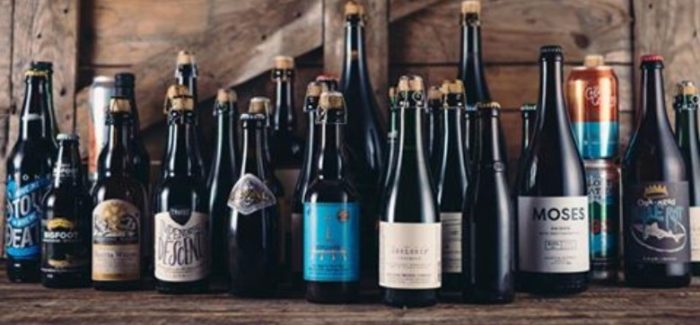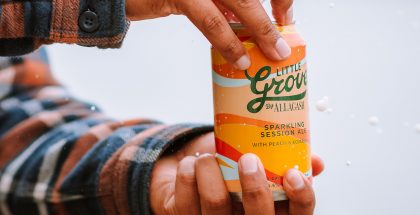Brewers Discuss The Pros and Cons of Cellaring
Like book lovers with towering bookshelves full of the classics, or hunters with heads o’ plenty adorning their walls, some beer nerds maintain extensive bottle collections. Indeed, aficionados of fermented malt and hops often engage in the art of cellaring beer. But not all of them agree with the idea of saving beer for later.
In particular, our own Mike Zoller – PorchDrinking’s Midwest editor — resolved to stop collecting beer in 2017; he ostensibly proclaimed that is better to drink beer than have beer. You can read his piece, here.
But, while Mike, and numerous people reacting to his piece on social media, provided opinions on the matter, we at PorchDrinking felt compelled to go to the source and ask brewers their feelings about cellaring beer. The opinions garnered… well, are as diverse as flight of beer.
Allagash Brewing
Jason Perkins, Brewmaster
Like a lot of things in life, it is difficult to come up with a set rule that applies to everything.
But, generally speaking, when we release a beer at Allagash, it is intended to be enjoyed right away. We would never sell a beer that needs more time to improve.
We would hold it ourselves in this case, as we will occasionally do. That said, there are certain beers that are a bit more robust then others when it comes to the effects of aging. If stored properly, certain beers can hold their core flavors and aromas longer then others.
I also understand that people have different personal preferences. Some of the staling flavors that I dislike, others may appreciate. In addition, I understand that people like to save beers for special occasions. For these reasons, I have never been overly pushy in my opinions, it is really up to the preferences of the consumer. But since you asked, Drink it Fresh should always be the default! I would personally say this to be the case even for stronger and sour beers, which have a stigma to them that they should be aged.
One other thing to note is that we started a little thing last year called “Drink it Now”, where we picked a date and used social media as a platform to get folks to drink that beer they have been saving, or the one they bought that day.
[EDITOR’S NOTE: On February 19, the #DrinkItNow campaign inspired beer drinkers and breweries from all over to engage in drinking beer they had been saving.]
Founders Brewing
Jeremy Kosmicki, Brewmaster
I get a LOT of questions regarding cellaring of our beers, and ultimately it comes down to personal preference. I, for one, do not intentionally age beer (sometimes I have big bottles that hang around much longer than I’d prefer, just waiting for the right opportunity to drink them, but that’s a whole other topic/rant).
My thought is that beer is almost always best served fresh.
Sometimes flavors from oxidation can “work” with the general flavor scheme – imperial stouts and old ales, for example. But with barrel-aged beers, they’ve already been aging for quite some time, and as a brewer/consumer, I feel like when they’re bottled up then they are ready for consumption. I will say that obviously I have drank KBS that is aged before, and it does hold up pretty well. The flavors definitely change – the coffee impression tends to fade over time, allowing the chocolate and oak character to move into the spotlight. So, if that’s how you prefer to drink your KBS, then by all means, age away!
(More: Why I’m Done Cellaring Beer)
New Belgium Brewing
Bryan Simpson, PR Director & Employee Owner
I’d have to say I/we are in agreement with Mike’s piece.
At New Belgium Brewing we go to great lengths to produce the highest quality and most consistent beers possible.
The longer a beer languishes in the market or on someone’s basement shelf, the greater the odds are that something can go wrong.
Sunlight, temperature and time can all produce off flavors and work against the brewer’s intent. With our wood-aged sour beers, we often age them more than two years on oak and then release at peak flavor. At that point, they should be consumed. We like to think we age the beers here, so you don’t have to do that at home.
Deschutes Brewery
Ryan Schmiege, Assistant Brewmaster
Cellaring beer can be great fun.
Choosing which beers to cellar is critical. Higher alcohol, malt forward beers often cellar better than real hoppy beers because the oxidation that occurs through the aging process is often noticed in hops first.
If someone is interested in cellaring beers, but is new to it, we often suggest that they buy two or more of the products they want to keep. Then enjoy one periodically and maybe write down some tasting notes. This will help to determine how long they may want to keep different beers according to their palate.
Temperature and light are important to control when aging beers. Most folks like to keep beer between a consistent 45⁰ to 60⁰F and in the dark. Heat and light will accelerate negative affects to aroma and flavor.
The most important thing is to have fun, enjoy the process and drink the beer at some point. Grab some friends and enjoy the beers.
Avery Brewing
Josh Rapp – Brewhouse Manager
Fred Rizzo – Head Brewer
Andy Parker – Chief Barrel Herder
Josh: I do keep cellar beer sometimes, but it is more for educational purposes than anything. Unless you are buying bottle-conditioned beer, nothing is happening in that bottle other than oxidation. Oxidation can do some interesting things to beers, but
I’ve found that in my cellar, beers generally do get worse the longer I cellar them. It’s fun and interesting to see overtime, but if your goal is to have the best beer possible, then you probably should drink it right when you buy it.
Fred: I do have a cellar, but not on purpose. I just get a lot of beers and I can’t drink them all
Andy: The beer connoisseur world is filled with people buying beer and waiting for it to improve. And for some people out there, I’m sure it’s worth it. If you really enjoy opening a five year vertical of stouts, go for it. For my palate, I discovered that over time the oxidative flavors overwhelm everything. I can’t dig through the big sherry oxidation and taste anything else.
Fred: The barrel-aging aspect of a beer can lend it to cellaring better, the oxidation can sometimes complement some of the barrel characters like the vanilla and caramel notes, and the oxidation can mellow out the hotness of some high ABV beers a bit.
Andy: Some beers might benefit from aging, especially Brett-infused or sour beers that are refermented in the bottle. Orval is a classic example. While I happen to prefer my Orval under a year old, there can be significant changes over a few years and trying them side by side can be educational. And while I haven’t had the pleasure of sitting down in front of twenty year vertical of Oud Beersel Oude Geuze, I’d certainly like to someday.
Josh: Once you get into the really extreme ABVs (15% ABV+), it can be okay. You just have to understand, with each bottle, why are you cellaring it.
Andy: If you like your food Thai Hot and more sherry/port in your beer, keep on aging and roll with it. I’ll have mine on the fresher side
If you prefer to cellar IPAs, just stop it. You’re doing it wrong. Fresh hops want to be in your flavor hole.
Fred:
With any sour beer, I think it should be drank the day you buy it. We did the cellaring for you. We took it out of that barrel, on purpose, on that specific day, so that you can buy it and drink it.
Half Acre
A message provided to its fans through Instagram:
We don’t advocate aging our beer under any circumstance.
While there is the chance that certain beers could improve over time, there are far too many unknowns that could prevent that from being true. We know and understand that people may want to put their own stamp on beer by dutifully laying it down until some ceremonious date in the future.
That said, the attributes of raw materials shift over time and the packaging process can complicate the lifecycle of beer, even if brewers do a great job. If we believed that a beer was going to be its best in one year, we would wait one year to release it. Fresh beer is king.
So, there you have it, folks. To say this sample size equates to any certain conclusions would be inaccurate, but we are hopeful this input provides a little insight into one’s beer purchasing habits.
For this writer, my impatience never leads to cellaring, hoarding, or even healthy saving of beer. You may be different. Feel free to let us know. And, if you are a brewer that would like to chime-in…write us. We can update this story anytime, or announce it via social media channels.
Let our beer journey never be one that we take too seriously. But, let us never stop learning about the best way to drink the best beer, brewed by the world’s best brewers.
Feature image courtesy of Allagash Brewing








Submit a Comment